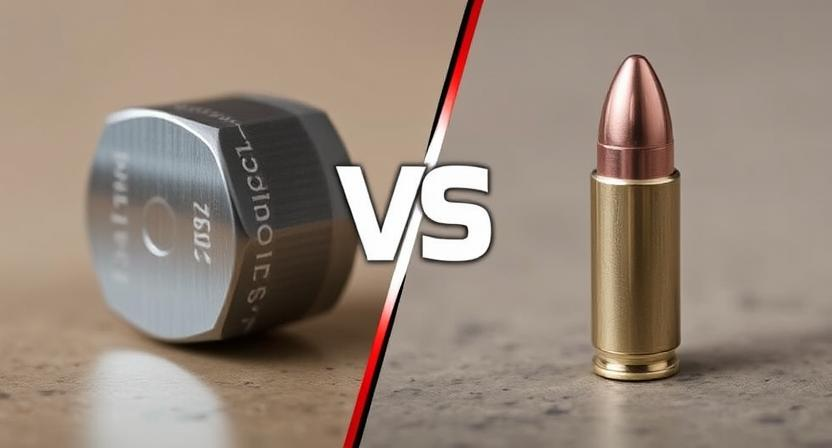We often hear about titanium's amazing strength. It’s used in everything from airplanes to medical implants. But when it comes to stopping bullets, what's the real story? Is a sheet of titanium really bulletproof? The short answer is both yes and no, and it all depends on what you're shooting at it.

Titanium is famous for its incredible strength-to-weight ratio. It's as strong as many steels but about 45% lighter. This makes it a top choice for applications where being light and tough is key. This titanium durability comes from its strong atomic structure, which gives it great tensile strength—the ability to resist being pulled apart. It also resists rust and can handle extreme heat, adding to its long-term toughness.
The word "bulletproof" is a bit misleading. In the world of armor materials, almost nothing is truly "proof" against every type of bullet. The correct term is "ballistic resistant." A material's ability to stop a bullet depends on three main things: the material itself, the bullet's power, and the thickness of the material.
So, will titanium stop a bullet? It can, but its success is a balancing act of physics.
A thin sheet of pure titanium, like the kind used for jewelry or phone cases, offers very little titanium protection. However, a thick plate of **titanium armor** is a different story. Engineers design ballistic armor to spread the bullet's energy over a wider area, slowing it down and stopping it before it can punch through. For effective protection, titanium is often used as a layer in a composite system, working with ceramics or other materials.
The type of bullet makes a huge difference in how bulletproof is titanium. Bullets from handguns are generally slower and easier to stop than high-velocity rifle rounds. Here is a breakdown of common threats:
Handgun Rounds (e.g., 9mm): A sufficiently thick plate of a strong titanium alloy can often stop a 9mm round. Ballistic tests show that certain titanium alloys, even at moderate thicknesses, can provide solid defense. The question, is titanium bulletproof to 9mm, often gets a "yes," provided the armor is specifically designed for it.
Rifle Rounds: High-powered rifle bullets, especially those with hardened or armor-piercing cores, carry far more energy. They are designed to defeat traditional metal armor. Against these threats, titanium alone is usually not enough and must be part of a ceramic or composite armor plate.
When we talk about titanium used in armor, we are almost always talking about a titanium alloy, not pure titanium. An alloy is a mix of titanium and other metals, which gives it even greater strength and better ballistic properties. The most common and successful alloy for armor is Ti-6Al-4V (Titanium-6 Aluminum-4 Vanadium).
This alloy is superior to pure titanium because the added elements create a tougher structure that can better absorb and deform the bullet's energy. This is why specialized bulletproof materials like these alloys are used in military vehicles and aircraft.
| Material | Pros | Cons | Typical Use |
|---|---|---|---|
| Titanium Alloy (Ti-6Al-4V) | Excellent strength-to-weight, high durability, corrosion-resistant. | High cost, requires significant thickness for rifle protection. | Aerospace, military vehicles, specialized body armor. |
| Ceramic (e.g., Alumina) | Extremely hard, excellent at defeating high-velocity rifle rounds. | Brittle (cracks after impact), heavy, single-shot protection. | Hard armor plates (Level III and IV). |
| Aramid Fibers (e.g., Kevlar) | Very light and flexible, great for soft armor. | Less effective against high-velocity rifle rounds, degrades with UV/water. | Vests, soft body armor (Level IIIA). |
A common question is about less traditional mixes, such as is gold titanium alloy bulletproof? The titanium-gold alloy is known for its use in medical implants because it is highly compatible with the human body and very strong—even stronger than pure titanium. However, it is extremely expensive and not designed for ballistic resistance. While it has great titanium strength, its use in armor is simply not practical or cost-effective compared to specialized ballistic alloys.
To summarize, titanium is not a magical, impenetrable shield, but it is a highly effective component in modern ballistic protection. Pure titanium is not bulletproof, but specialized, thick titanium alloy plates provide excellent protection against many common threats, especially handgun rounds like the 9mm. Its ability to offer high titanium durability with a lower weight than steel makes it a valuable, though costly, choice for high-performance armor materials. When you see titanium used in protective gear, remember it's the specific alloy and the overall armor design that truly determine its ability to stop a bullet.
For professional titanium supply, custom processing, or business inquiries,
Contact us for consultation, cooperation, and custom manufacturing!